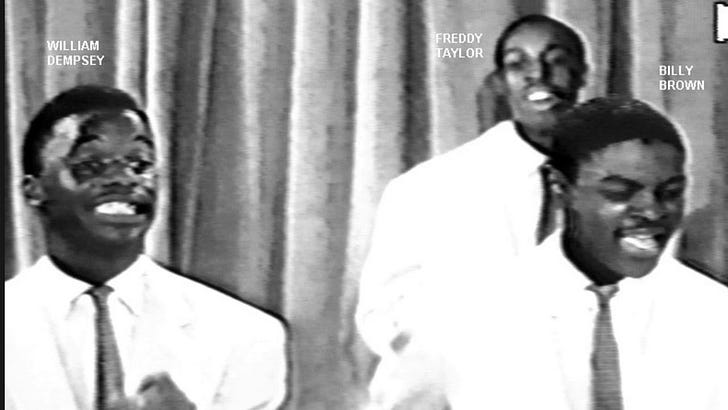The Harptones – “Love Me Completely” 1959 single available on Anthology: The Definitive Collection. Here’s a doo wop group not nearly as well known as they should be. They didn’t have big hits, but they made some spectacular records featuring lead tenor vocalist Willie Winfield with arrangements by pianist and baritone singer Raoul Cita. Here we have the harmonies of the group over odd tinkly piano playing triplets and a clipped guitar part, and Winfield falls in love with the very pretty melody. Take us to the bridge and there’s now a flute wrapping around all the singer. I’m not it’s possible not to love this record completely.
Wilco – “Theologians” 2004 from A Ghost Is Born. This is the title track from the last Wilco album almost all fans loved equally. I mean the title is in the track, not the title of the song. Anyway, this was the first album the band released after Yankee Hotel Foxtrot unexpectedly vaulted them to a much higher level of success. It’s also the only album on which Jeff Tweedy plays most of the lead guitar himself. He does some pretty cool things on that instrument here, mixing a bit of heavy electrical chording with soaring flights up the neck. It’s very effective, and very much a part of the song. Now the song is a typical Tweedy mishmash lyrically. I assume he came up with the first line – “Theologians / Don’t know nothin’ / About my soul” and kept going from there. My favorite part is the second verse with the Latin line – “Illiterati lumen fidei” which just sounds cooler than “The light of faith for the illiterate.” Somehow a ghost is born by the end, a cherry ghost, in fact – Tweedy never worried much if the words make sense as long as they sound good and fit the way he’s delivering them. This is a solid track from the last transition time in the band’s history.
The Flying Burrito Brothers – “Dim Lights, Thick Smoke (and Loud, Loud Music) 1976 release from Sleepless Nights. This album was a posthumous collection of previously unreleased cuts by Gram Parsons and the Flying Burrito Brothers. “Dim Lights” was one of many country clasics the Burritos recorded just before Parsons left the band. I had no idea until now it was originally recorded by Flatt & Scruggs back in 1952 – I’ve heard many versions, but somehow always associate it with Dwight Yoakam. I never really paid attention to the words before. It’s a song about a man accusing a woman of being more interested in hanging around a music club than in being with him – that may not be a bad thing, I think. But man, it sure does have a great hook, a strong tune, and a virtually indestructible structure. The Burritos only sing the first verse, and emphasize the chorus, singing it I think four times. Parsons voice is front and center, with Chris Hillman shadowing him on harmony on the chorus. There’s also a whole lot of Sneaky Pete Kleinow on pedal steel. I understand why the Flying Burrito Brothers weren’t accepted by country fans at the time, as they are reckless with the rhythms in a way you couldn’t be on country radio. But as a rock fan who fell in love with country partially through the gateway drug of this band, I still think this is a brilliant take on a great song.
Mississippi John Hurt – “Stack-O-Lee” 1928 available on The Complete 1928 Okeh Recordings. Nobody has ever been better at touching fingers on a guitar fretboard than the way Mississippi John Hurt did it. Just listen to the gentle way he fingerpicks this classic murder ballad based on real events right here in my hometown of St. Louis. (I covered this song and “Frankie and Johnny,” also based on St. Louis killings, in the book I co-wrote with Amanda Doyle, St. Louis Sound: An Illustrated History, just in case you’re looking for something bigger to read and hold on your lap.) It’s so delicate, yet so firm; so nuanced yet so propulsive His singing is sweet, too, even as he tells the familiar story of Stack-O-Lee shooting down Billy de Lyon, despite his two babies and darling loving wife, over an argument about a Stetson Hat. There are hundreds of variants of this song – in this one, Stack-O-Lee is brought to justice and killed after a jury trial. In the middle of the song, Hurt sort of moan-hums his way until that .44 is brought out to kill Billy, an interesting approach that delivers the message even without words.
Miles Davis – “Springsville” 1957 from Miles Ahead. I’d be willing to bet that 99% of the people reading this neer heard the name John Carisi before today. He was the man who wrote this tune – he’d also written “Israel” from Davis’ classic Birth of the Cool sessions several years earlier. Based on these two numbers, I find it hard to figure why he couldn’t have become better known but I guess it always takes more than just talent to make it big in music. This album was the first of three collaborations between Miles Davis and arranger Gil Evans (not counting Birth of the Cool which included Evans in a different role). These records are like nothing else in jazz. Evans takes this spritely tune and dresses it up with thick slabs of big band harmonies while Davis plays the melody and variations above. It’s the kind of record few jazz performers got the money to make in those days. This particular cut will dance in your head for hours once you hear it, so be prepared for an earworm.


